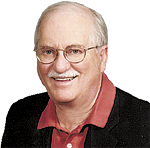Country music singer and song writer Mac Davis, I am sure, had his tongue placed firmly in his cheek with his lyrics, “Oh Lord, it’s hard to be humble when you’re perfect in every way, but I’m doing the best that I can.”

I doubt that any of us would offer such a high opinion of ourselves, at least not publicly, and I am sure that Davis would be amused that anyone would take seriously his boast of perfection.
At the same time, humility is hard to come by in our society, even among some who are in places of leadership in our denomination and in our churches. Jeff Iorg, the president of Golden Gate Baptist Seminary in Mill Valley, Calif., has written an insightful and helpful book, “The Character of Leadership,” published this year by Broadman and Holman in Nashville. His book is subtitled “Nine Qualities that Define Great Leaders.” One of them is humility.
Iorg admits that humility “is not my strength” and that he is still “on the humility learning curve.” One of the challenges he faces in acquiring that trait that often eludes the best of us is “a lack of role models.” The seminary president writes, “There seem to be very few genuinely humble leaders.”
Iorg’s conclusion is especially troubling and disappointing, for as believers – whether leaders or not – we are instructed with authority to “let the same mind be in you that was in Christ Jesus,” who after becoming like us and taking on the role of a servant, “humbled himself and became obedient to the point of death, even on a cross.”
Iorg’s assessment is particularly disconcerting when we have the testimony of John the Baptist, who, when his own popular and successful ministry yielded to the superior work of his cousin Jesus, said with appropriate and commendable humility, “He must increase, but I must decrease.”
As Eugene Peterson’s interpretation of the Bible, “The Message,” aptly puts it, the Baptizer says of Jesus to his own followers, “This is the assigned moment for him to move into the center, while I slip off to the sidelines.”
Such humility is inspiring, and we can only grieve for our denomination and for our churches that too little of John’s attitude is evident today.
To be humble does not mean that we must debase ourselves by pointing to our inadequacies and emphasizing our unworthiness, though we surely are unworthy even if we are adequate to the tasks set before us.
Instead, as Iorg points out, “Humility is appropriate self-appraisal, seeing yourself as God sees you. Humility is adopting God’s perspective on who you are and what you are assigned to do. It is the attitude that emerges from the spiritual discipline of thinking about yourself like God thinks of you.”
If for any of us, it is “hard to be humble,” Iorg offers hope. His chapter dealing with the subject is entitled “Learning Humility.” Class is in session.